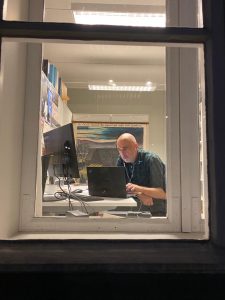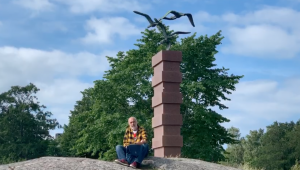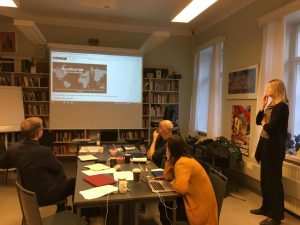By Dr. Andrew G. Newby,
University Lecturer, Centre for Nordic Studies
At the Centre for Nordic Studies, we have always promoted a symbiotic relationship between teaching and research. This has been a guiding principle in the development of “Nordic Studies Online”, a MOOC scheduled for launch in 2021, that we have developed under the auspices of the Digital Leap initiative. Therefore, we had already been preparing plenty of recorded material, and thinking how to make the best use of our personal and institutional research networks, when global events meant that most university teaching moved to online delivery in March 2020. While the initial reaction – at least for a few days – felt more like crisis management, it soon became obvious that amidst the turmoil there were ways of looking positively at the opportunities provided by the move to online teaching and mentoring.

During spring, I discussed the coming academic year with our European & Nordic Studies MA students, to gauge what sort of online delivery they would find the most effective. I settled on a certain type of “hybrid” approach – mixing pre-recorded pieces to camera of 10-20 minutes, and live lectures (in order to give structure to the students’ week as well as my own) which were then put onto Moodle for a period (permitting anyone who was unable to attend live to catch up in their own time). This was supplemented by other online content, especially podcasts, (which were a flexible way for the students to learn while taking exercise, travelling, doing housework etc.) and short video documentaries. When appropriate, and mainly as a means of maintaining positive mental health, it was possible to arrange informal outdoor “tutorials” where students could come to discuss the course topics (or anything else!)
For a Nordic Studies programme based in Helsinki, the normalisation of online content has meant that our students have had more chances than before to benefit directly from our extensive research and teaching partnerships. Taking the “Nordic Societies and Cultures” survey course, for example, I was lecturing twice a week to group of sixty students, from a diverse range of backgrounds (discipline, academic experience and in terms of culture / nationality). In this course I was able to use material that I had already prepared for the Digital Leap project (such as short films on Finnish emigration made “on location” in Muonio and Hanko), and the necessity of creating more new content also provided material for the forthcoming MOOC. I got in touch with friends and colleagues across the world to discuss the possibility teaching collaborations, and this led to a series of pre-recorded interviews on topics ranging from the welfare state to the Scandinavian influences in the Baltic lands, and from broad issues of postcoloniality to nineteenth-century Trans-Atlantic emigration. The primary benefit of this has been to give students access to the latest research by world-leading experts, in a way that would have been more difficult otherwise. Even if it had been possible to fly someone over from Nuuk, North Dakota, or Gdansk to give a class, in the past this has generally been an add-on to a “formal” research presentation, and often the paper is two hours and might not fit so well into the course. With online delivery, a colleague can drop in to a class for 20-30 minutes and present something that can be easily contextualised within the overall course structures, or arrange for a half-hour interview or discussion about one of the course themes, at a convenient time – and this can be shown as part of an asynchronous delivery. This type of cooperation, having been normalised, should continue even if academic life returns to how it used to be. We had already been moving in this direction as a way of reducing air travel, and 2020’s enforced reduction in mobility has accelerated the trend.
This optimistic reading of the last few months’ teaching challenges should not minimise the sense of loneliness, disconnection and exhaustion that has certainly been felt by both students and teachers during this period. I have often felt that I am on the brink of a crisis, overly dependent on technology, and giving lectures in inappropriate workspaces (including on a park bench). Maybe when we return to the classroom I will have an opportunity to reflect more dispassionately on these negative factors. For now I think it is more beneficial to remain focussed on the positives, to keep striving to improve my own skills, and give the students as good an experience as possible during what is undoubtedly an extremely trying time in their university careers.

